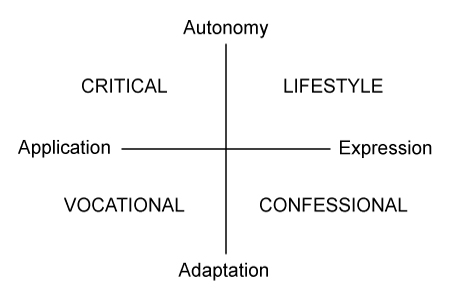Digital Identit(y/ies): A Postmodernist Perspective
Thursday, April 22nd, 2010In researching approaches to digital identity, I recently came across a model which I found particularly interesting. In their schema of experiential learning, Usher, Bryant et al. (1996) describe how lifelong learning can be understood in relation to two continua (autonomy to adaptation, and application to expression) which create four specific contemporary social practices: lifestyle, confessional, vocational, and critical.
The idea of identity formation is particularly evident in the two opposing practices of the confessional and the critical:
Confessional Practice
Drawing largely on Foucault’s notion of the ‘confession’ – which they describe as a “ritual that unfolds within a power relationship” – Edwards and Usher (2001) argue that in a confessional practice, the learner adopts the dominant socio-economic environment. In a process where the “externally imposed discipline has given way to the self-discipline of an autonomous subjectivity,” (12-13) the learner is disempowered in accepting the dominant (or often solitary) model of learning, aligning his subjectivities with formal educational discourses to articulate his own learning needs. Here, the pedagogic emphasis is on self-improvement, self-development and self-evaluation, which Tenant (2009) observes is particularly manifest in learning plans and portfolio development. This promotes a modernist notion of identity; one that is stable, unified, coherent and developmental.
Critical Practice
Critical perspectives argue that – unlike in the confessional practice, where empowerment is illusory – practice authenticates empowerment through self and social transformation. Autonomy is achieved through questioning, challenging and potentially changing (rather than adapting to) particular learning contexts. Meanings are not a given, but are produced through discursive practices (Tenant, 2009). Corresponding literature on critical pedagogies emphasises the politics of representation in the cultural processes of learning and education, and sees representation of self as a socially and politically constituted agent that shapes identity formation. Edwards and Usher (2001) see critical practice as promoting a postmodernist perspective which understands culture as an ongoing process, in a state of constant flux, and recognises that identity can be multiple, fragmentary and pseudonomic.
So how does identity formation within these two practices translate to the formation of digital identities and reputations, and to the representation(s) of self on the social web?
References
Edwards, R., & Usher, R. (2001). Lifelong Learning: A Postmodern Condition of Education? Adult Education Quarterly. 51, 273-287.
Tennant, M. (2009). Lifelong learning as a technology of the self. In Illeris, K., Contemporary Theories of Learning. London: Routledge. 147-158.
Usher, R., Bryant, I., & Johnston, R. (1996). Adult Education and the Postmodern Challenge: Learning Beyond the Limits. London: Routledge.


